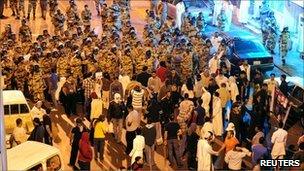Saudi Arabia imposes ban on all protests
- Published

All protests and marches are to be banned in Saudi Arabia, the interior ministry has announced on state TV.
Its statement said security forces would use all measures to prevent any attempt to disrupt public order.
The announcement follows a series of protests by the kingdom's Shia minority in the oil-producing eastern province.
Last month, King Abdullah unveiled a series of benefits in an apparent bid to protect the kingdom from the revolts spreading throughout many Arab states.
"Regulations in the kingdom forbid categorically all sorts of demonstrations, marches and sit-ins, as they contradict Islamic Sharia law and the values and traditions of Saudi society," the Saudi interior ministry statement said.
It added that police were "authorised by law to take all measures needed against those who try to break the law".
The protests in the Eastern Province - where much of the country's crude oil is sourced - have been demanding the release of prisoners who demonstrators say have been held without trial.
The announcement of the crackdown on protests follows the return, last week, of King Abdullah to the capital after an absence of several months due to illness.
He unveiled an additional $37bn (£22.7bn) in benefits for citizens, including a 15% pay rise for state employees, as well as extra funds for housing, studying abroad and social security.
- Published23 February 2011
- Published23 February 2011
- Published30 December 2011